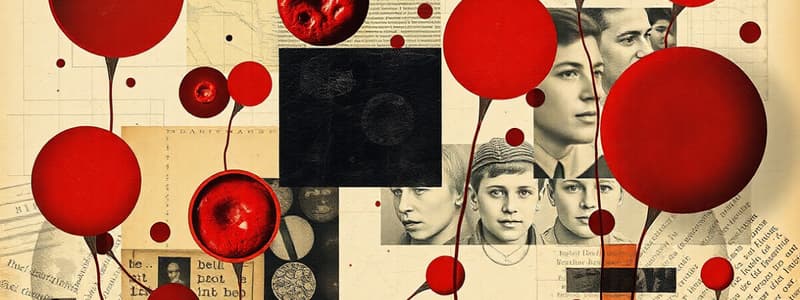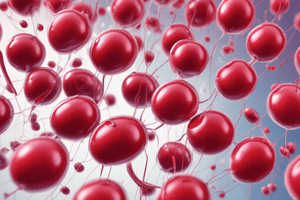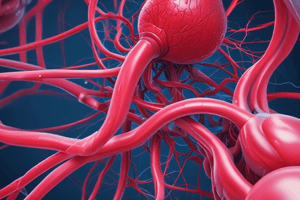Podcast
Questions and Answers
What is the fundamental difference between an antigen and an antibody?
What is the fundamental difference between an antigen and an antibody?
- An antigen is only found in bacteria, while an antibody is only found in viruses.
- An antigen directly attacks pathogens, while an antibody helps in the repair of damaged tissues.
- An antigen is a type of immune cell, while an antibody is a molecule that triggers an immune response.
- An antigen is usually present on the surface of cells and elicits an immune response, while an antibody is produced by the immune system to target foreign antigens. (correct)
If a person has blood type A, which antibody does their serum contain?
If a person has blood type A, which antibody does their serum contain?
- Anti-A
- Both Anti-A and Anti-B
- Anti-B (correct)
- Neither Anti-A nor Anti-B
Which of the following genotypes corresponds to blood type O?
Which of the following genotypes corresponds to blood type O?
- AA
- AO
- OO (correct)
- AB
Why can individuals with blood type AB receive blood from any ABO blood type?
Why can individuals with blood type AB receive blood from any ABO blood type?
Why is knowing the Rhesus (Rh) factor important in blood transfusions?
Why is knowing the Rhesus (Rh) factor important in blood transfusions?
Which of the following describes the inheritance pattern of the Rhesus (Rh) factor?
Which of the following describes the inheritance pattern of the Rhesus (Rh) factor?
What is a potential risk when an Rh- mother carries an Rh+ fetus?
What is a potential risk when an Rh- mother carries an Rh+ fetus?
For blood transfusions, what is the implication of a recipient having anti-A antibodies in their serum?
For blood transfusions, what is the implication of a recipient having anti-A antibodies in their serum?
What is the purpose of injecting an Rh- mother with anti-Rh antibodies (RhoGAM) after the birth of an Rh+ child?
What is the purpose of injecting an Rh- mother with anti-Rh antibodies (RhoGAM) after the birth of an Rh+ child?
In the context of blood transfusions, what does it mean to be a 'universal donor' and which blood type is considered the universal donor?
In the context of blood transfusions, what does it mean to be a 'universal donor' and which blood type is considered the universal donor?
If two parents, one with blood type AB and the other with blood type O, have children, what are the possible blood types of their offspring?
If two parents, one with blood type AB and the other with blood type O, have children, what are the possible blood types of their offspring?
In blood typing, what does agglutination indicate?
In blood typing, what does agglutination indicate?
A person with blood type B+ is receiving a blood transfusion. Which blood types are safe for them to receive?
A person with blood type B+ is receiving a blood transfusion. Which blood types are safe for them to receive?
What is the role of antibodies in blood transfusions?
What is the role of antibodies in blood transfusions?
Which situation poses a risk for hemolytic disease of the newborn (HDN)?
Which situation poses a risk for hemolytic disease of the newborn (HDN)?
Considering ABO blood groups, what is co-dominance?
Considering ABO blood groups, what is co-dominance?
What is the significance of the haemagglutination inhibition test?
What is the significance of the haemagglutination inhibition test?
Which of the following genotypes would result in a person having blood type A?
Which of the following genotypes would result in a person having blood type A?
Why is it crucial to avoid high similarity percentages when submitting lab reports via Turnitin?
Why is it crucial to avoid high similarity percentages when submitting lab reports via Turnitin?
Considering a scenario where two parents both have the genotype AO for blood type. What is the probability that their child will have blood type O?
Considering a scenario where two parents both have the genotype AO for blood type. What is the probability that their child will have blood type O?
During a blood transfusion, it is observed that the recipient's antibodies start attacking the donor's red blood cells. Which of the following processes is initiated by this event?
During a blood transfusion, it is observed that the recipient's antibodies start attacking the donor's red blood cells. Which of the following processes is initiated by this event?
If a patient with blood type A- needs a blood transfusion, what is the next best alternative if A- blood is not immediately avaliable?
If a patient with blood type A- needs a blood transfusion, what is the next best alternative if A- blood is not immediately avaliable?
Why do anti-A and anti-B antibodies exist even without prior transfusions or exposure to incompatible blood types?
Why do anti-A and anti-B antibodies exist even without prior transfusions or exposure to incompatible blood types?
A father is blood type A and the mother is blood type B. They have a child that is blood type O. The genotypes of the father and mother are:
A father is blood type A and the mother is blood type B. They have a child that is blood type O. The genotypes of the father and mother are:
Consider a blood typing experiment: Macroscopic agglutination occurs with anti-A and anti-D, but not with anti-B. Determine the blood type.
Consider a blood typing experiment: Macroscopic agglutination occurs with anti-A and anti-D, but not with anti-B. Determine the blood type.
How does the injection of anti-Rhesus antibodies prevent fetal haemolysis? (select the best answer)
How does the injection of anti-Rhesus antibodies prevent fetal haemolysis? (select the best answer)
True or false: Examinations office will send an invite letter for information on how to submit your lab report.
True or false: Examinations office will send an invite letter for information on how to submit your lab report.
What is the deadline for the lab report submission?
What is the deadline for the lab report submission?
Which of the following provides guidelines for questions to be answered by students?
Which of the following provides guidelines for questions to be answered by students?
You have type O blood. What antibodies do you have in your serum?
You have type O blood. What antibodies do you have in your serum?
What is the process by which red blood cells clump together due to an antibody-antigen reaction?
What is the process by which red blood cells clump together due to an antibody-antigen reaction?
In the context of Rh factor, which of the following genotypes indicates an Rh-negative individual?
In the context of Rh factor, which of the following genotypes indicates an Rh-negative individual?
During blood transfusions, what could happen if a recipient with Type A blood receives Type B blood?
During blood transfusions, what could happen if a recipient with Type A blood receives Type B blood?
If a woman with Rh-negative blood is pregnant, what is administered to prevent the development of Rh antibodies that may harm the developing fetus in subsequent pregnancies if the fetus is Rh positive?
If a woman with Rh-negative blood is pregnant, what is administered to prevent the development of Rh antibodies that may harm the developing fetus in subsequent pregnancies if the fetus is Rh positive?
What is the role of antigens present on red blood cells?
What is the role of antigens present on red blood cells?
If one parent has blood type AB and the other has blood type O, what are the possible blood types of their children?
If one parent has blood type AB and the other has blood type O, what are the possible blood types of their children?
Which blood type is known as the universal recipient as they can receive blood from all ABO blood types?
Which blood type is known as the universal recipient as they can receive blood from all ABO blood types?
An individual has the genotype OO. What blood type are they?
An individual has the genotype OO. What blood type are they?
Why is it important to use separate toothpicks when mixing blood with different antisera (anti-A, anti-B, anti-D) during blood typing?
Why is it important to use separate toothpicks when mixing blood with different antisera (anti-A, anti-B, anti-D) during blood typing?
In a scenario where a patient with blood type A+ requires a blood transfusion but only A- blood is available, why is this transfusion generally considered safe?
In a scenario where a patient with blood type A+ requires a blood transfusion but only A- blood is available, why is this transfusion generally considered safe?
If a mother is Rh-negative and carries a fetus that is Rh-positive, what is the primary reason for administering anti-Rh antibodies (RhoGAM) after delivery?
If a mother is Rh-negative and carries a fetus that is Rh-positive, what is the primary reason for administering anti-Rh antibodies (RhoGAM) after delivery?
During a blood typing experiment, you observe agglutination (clumping) when a blood sample is mixed with anti-A serum and anti-D serum, but not with anti-B serum. Based on these results, what is the blood type?
During a blood typing experiment, you observe agglutination (clumping) when a blood sample is mixed with anti-A serum and anti-D serum, but not with anti-B serum. Based on these results, what is the blood type?
Considering a scenario where two parents both have the genotype AO for blood type, which of the following statements accurately describes the possible blood types (phenotypes) of their children and the associated probabilities?
Considering a scenario where two parents both have the genotype AO for blood type, which of the following statements accurately describes the possible blood types (phenotypes) of their children and the associated probabilities?
Flashcards
What is an antigen?
What is an antigen?
A molecule capable of inducing an immune response, such as antibody production, in a host organism.
What is an antibody?
What is an antibody?
A protein produced by the immune system in response to an antigen, designed to neutralize or destroy it.
How many different blood groups are there?
How many different blood groups are there?
Four; A, B, AB, and O.
What are the three alleles of the gene that determine blood groups?
What are the three alleles of the gene that determine blood groups?
Signup and view all the flashcards
What are the six possible genotypes of blood groups?
What are the six possible genotypes of blood groups?
Signup and view all the flashcards
What is the dominance relationship between A, B, and O alleles?
What is the dominance relationship between A, B, and O alleles?
Signup and view all the flashcards
What antigens and antibodies are present in blood group A?
What antigens and antibodies are present in blood group A?
Signup and view all the flashcards
What antigens and antibodies are present in blood group B?
What antigens and antibodies are present in blood group B?
Signup and view all the flashcards
What antigens and antibodies are present in blood group AB?
What antigens and antibodies are present in blood group AB?
Signup and view all the flashcards
What antigens and antibodies are present in blood group O?
What antigens and antibodies are present in blood group O?
Signup and view all the flashcards
What must be ensured in blood transfusions?
What must be ensured in blood transfusions?
Signup and view all the flashcards
What happens if mismatched blood is transfused?
What happens if mismatched blood is transfused?
Signup and view all the flashcards
What is the Rhesus (Rh) factor?
What is the Rhesus (Rh) factor?
Signup and view all the flashcards
What are the alleles for the Rhesus factor?
What are the alleles for the Rhesus factor?
Signup and view all the flashcards
Who cannot receive blood from Rh positive?
Who cannot receive blood from Rh positive?
Signup and view all the flashcards
When the mother doesn't have the Rh antigen(Rh-)?
When the mother doesn't have the Rh antigen(Rh-)?
Signup and view all the flashcards
What is Hemolytic Disease of the Newborn (HDN)?
What is Hemolytic Disease of the Newborn (HDN)?
Signup and view all the flashcards
What cause the fetal haemolysis?
What cause the fetal haemolysis?
Signup and view all the flashcards
How to you prevent HDN in newborns?
How to you prevent HDN in newborns?
Signup and view all the flashcards
Which blood type is the 'universal recipient'?
Which blood type is the 'universal recipient'?
Signup and view all the flashcards
Which blood type is the 'universal donor'?
Which blood type is the 'universal donor'?
Signup and view all the flashcards
What does agglutination indicate in blood typing?
What does agglutination indicate in blood typing?
Signup and view all the flashcards
Study Notes
- MED-109 Biology II, Lab practical 1 focuses on the topic of human blood groups.
Learning Objectives
- To distinguish between antigens and antibodies.
- Aim to explain the differences between human blood types.
- Need to understand the procedure of the haemagglutination inhibition test.
- Expected to explain blood type choice during transfusions.
- Required to explain the inheritance pattern of blood type alleles based on lecture and practical knowledge.
Assessment Details
- A lab report on human blood groups is required.
- Lab guidelines template is released on Moodle on Thursday February 20th, containing questions and marking guidelines.
- The lab report release date is Thursday, February 20th (afternoon). -A student template (answer version), where answers should be provided, will also be released on Moodle on Thursday, February 20th.
- It must be submitted online via Turnitin.
- The lab report submission deadline is Friday, February 28th at 5 pm.
- Students are advised not to copy text from the lab guidelines to avoid high similarity scores in Turnitin.
- Submit only the student template document (answer version) and not the guideline document.
Phenotype and Genotype of Blood Groups
- Four blood groups exist: A, B, AB, and O.
- These blood groups result from combinations of 3 different alleles of 1 gene, symbolized as A, B, and O (or IA, IB, and i).
- Each person carries two alleles, leading to 6 possible genotypes: AA, AO, BB, BO, AB, and OO.
- The A and B alleles are co-dominant, and both are dominant over the recessive O allele.
Blood Group Characteristics
- Blood group A has either genotype AA or AO.
- Blood group B has either genotype BB or BO.
- Blood group AB has genotype AB.
- Blood group O has genotype OO.
Antigens and Antibodies
- An antigen is a molecule capable of inducing an immune response, such as antibody production, in the host organism.
- Antigens are usually present on the surface of cells, bacteria, viruses etc.
- The immune system responds to foreign invaders by producing specific antibodies against foreign antigens.
Blood Transfusions: Antigens and Antibodies
- Blood group A has antigen A and produces antibodies against antigen B.
- Blood group B has antigen B and produces antibodies against antigen A.
- Blood group AB has antigens A and B and produces no antibodies.
- Blood group O has no antigens and produces antibodies against antigens A and B.
Blood Group Compatibility
- Blood serum must not carry antibodies against a donor's antigens, or haemagglutination will occur.
- For example, if a person with blood type A receives blood from a person with blood type B, the anti-B antibodies in the recipient's blood will attack the B antigens on the donor's red blood cells leading to lysis of the RBC.
Haemagglutination Method
- This method is used to determine blood type by observing the reaction when blood is mixed with added antibodies.
The Rhesus (Rh) Factor
- The Rh (Rhesus) factor, also known as the D antigen, is a prominent antigen that may be present on red blood cells.
- The Rh factor is determined by two alleles (Rh+/rh- or D/d), with Rh+ being dominant and rh- recessive.
- Rh positive individuals have the Rh antigen on their red blood cells.
- Rh negative individuals do not have the Rh antigen on their red blood cells.
- Rh negative individuals cannot receive blood from Rh positive individuals.
- Rh positive individuals can receive blood from both Rh negative and positive individuals.
Rhesus Factor Inheritance
- Autosomal dominant pattern: Rh+ is the D allele (dominant), and rh- is the d allele (recessive).
Blood Transfusion Compatibility
- O+ has Rh antigens and anti-A and anti-B serum antibodies.
- O- has no antigens, but it has anti-A and anti-B serum antibodies.
- A+ has A and Rh antigens, and anti-B serum antibodies.
- A- has A antigens and anti-B serum antibodies.
- B+ has B and Rh antigens, and anti-A serum antibodies.
- B- has B antigens and anti-A serum antibodies.
- AB+ has A, B, and Rh antigens and no serum antibodies.
- AB- has A and B antigens and no serum antibodies.
- Anti-Rh antibodies are only produced in the blood of Rh- people.
The Rhesus Factor and Pregnancy
- Haemolytic disease of the newborn (HDN) can occur if an Rh- mother is pregnant with an Rh+ child.
- During pregnancy or labor, fetal red blood cells may cross into the mother's bloodstream, causing her to produce anti-Rhesus antibodies.
- In subsequent pregnancies, these antibodies can cross the placenta and attack the Rh+ fetus, leading to fetal haemolysis and stillbirth.
Prevention of Fetal Haemolysis
- Injection of the mother with anti-Rhesus antibodies (RhoGAM) after the birth of the first Rh+ child.
Blood Transfusions
- AB+ is the universal recipient.
- O- is the universal donor.
- Blood group typing experiment is demonstrated via a youtube link.
Procedure for Determining blood groups
- Obtain 3 glass slides and label them with anti-A, anti-B and anti-D.
- Soak a piece of cotton wool in rubbing alcohol and disinfect your finger.
- Use a sterilized lancet to prick your finger and place a drop of blood to on each slide.
- Add 1 drop of anti-A, anti-B and anti-D serums to the appropriate slides and mix with separate toothpicks.
- Allow 1-2 minutes for agglutination to occur
- Observe samples macroscopically and microscopically using your lense to determine blood group and fill in data on lab report.
Studying That Suits You
Use AI to generate personalized quizzes and flashcards to suit your learning preferences.




